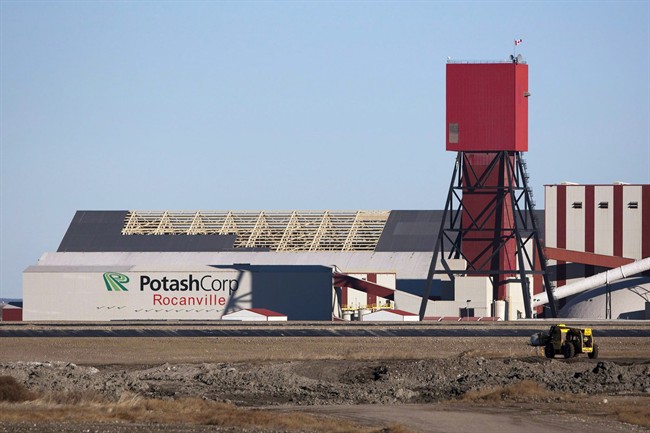SASKATOON – PotashCorp. (TSX:POT) is cutting its workforce by about 18 per cent, affecting 1,045 people – with the biggest hits in its home province of Saskatchewan as well as Florida and New Brunswick.

The Saskatoon-based company says the decision is necessary because of soft demand for potash and phosphates, two major types of fertilizer used to promote crop growth.
“This is a difficult day for our employees and our company,” said Bill Doyle, PotashCorp’s president and chief executive.
“While these are steps we must take to run a sustainable business and protect the long-term interests of all our stakeholders, these decisions are never easy.
“We understand the impact is not only on our people, but also in the communities where we work and live, and PotashCorp will work hard to help those affected through this challenging time.”
Watch the video above: PotashCorp CEO and president Bill Doyle announces job cuts at facilities in Saskatchewan, New Brunswick, the United States and Trinidad
PotashCorp says the biggest job cuts will be in its home province, where 440 people will be affected – about 42 per cent of the total announced Tuesday.
Most of those will be at its Lanigan division, where one of two mills will suspend production by the end of 2013, and its Cory divison, where production will be reduced, and the Saskatoon headquarters.
Watch the video below: The Government of Saskatchewan and affected communities respond after PotashCorp cuts hundreds of jobs
The Allan and Rocanville facilities are not expected to be impacted and the expansion at Rocanville, which is approximately 90 per cent complete, will continue.
The Saskatchewan government said it would dispatch its rapid response teams to help those affected find work in other sectors.
“We are fortunate that this has occurred at a time of relative labour market strength and that our economy today is more diversified than ever,” Saskatchewan Premier Brad Wall said in a statement.
The premier said the government would also look to improve its work to match training resources with labour needs.
MORE: Saskatchewan government responds to PotashCorp layoffs
In addition to the cuts in Saskatchewan, New Brunswick will see 130 people affected while the rest will be outside Canada, including more than 435 in the United States.
Watch the video below: The Penobsquis potash mine in N.B. will be shutting down early in 2014.
Production will be ceased at the Penobsquis facility in New Brunswick by the end of the first quarter 2014. The company said this will allow them to accelerate development at the Picadilly mine.
Florida will lose 350 jobs while another 85 people will be affected in North Carolina.
One of two phosphate plants in White Springs, Fla., and the Suwannee River chemical plant, will be closed. A loss of capacity at White Springs is expected to be partially offset by higher output at Aurora, N.C.
There will be another 40 jobs affected in other parts of the United States and in Trinidad.
The company will pay out approximately $70 million in severance to affected employees.
PotashCorp is Canada’s largest producer of potash and controls more than 25 per cent of the world’s supply of potash, which is sold around the world to help farmers boost crop production.
MORE: Five things to know about potash in Saskatchewan
The cuts come amid lower prices for potash.
The commodity and the companies that produce it have been hit hard this year after Russian-based Uralkali, one of the world’s largest potash producers, quit the Belarusian Potash Company (BPC) export partnership.
In expectation of lower prices on the world markets, China and India – key markets for fertilizer – delayed purchases, sending shipments plunging.
PotashCorp said buyer caution and competitive pressures pushed its average realized price for potash to $307 per tonne for the third quarter, down from $429 per tonne in the same period last year.
However, speculation that the European potash partnership may be renewed has increased in recent weeks following comments by Russian officials that Belarus will send home Vladislav Baumgertner, Uralkali’s chief executive, whom it placed under house arrest and accused of harming the Belarusian economy.
The announcement came after former Russian presidential candidate Mikhail Prokhorov said he would buy 22 per cent of Uralkali from billionaire Suleyman Kerimov, who fell out with Belarusian President Alexander Lukashenko.
BPC accounts for about 43 per cent of the global potash market and competes with Canpotex, a Canadian-based group that sells potash abroad on behalf of PotashCorp., Mosaic Co. and Agrium (TSX:AGU).
With files from Global News, The Associated Press


Comments